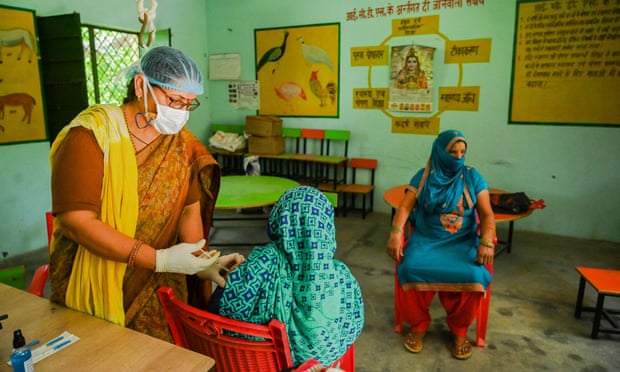The Covid-19 pandemic in India was a surprise for us all to say the least. The pandemic overturned the world in 2020 and everything began to change. However, the one thing that has been shamelessly constant is the blatant divide between the men and women. Our country is too accustomed to it.
One imagined that the multiple lockdowns might lead to the realization of the importance of women in traditional households. However, this is not the reality. Men in power have further subjugated women, turning them away from receiving a vaccine that could ultimately save their lives. The question that arises is how is this a reality? How is there a gender gap in this area? An area that can save lives!
The Figures
For every 1000 men getting the vaccine in India, only 856 are given to women.
The most populous states like Uttar Pradesh, West Bengal, Delhi, and more report a large discrepancy of doses given. Only 42% of the doses are given to women in Uttar Pradesh. It is only in some states like Andhra Pradesh that women have received more in comparison to men.
Data lends the idea that men have a larger load of the virus. But, women have a larger risk of mortality. According to a study in Lancet, globally men are at a greater risk of contraction and mortality of Covid-19, however, in a couple of countries like India, the mortality rate is higher within women.
The Why
In India the government is restricting women from receiving the vaccine – another restriction on their lives. The situation is in need of a dire change; it illustrates the structural inequalities that are within the infamous patriarchal society. While women are the backbone of homes specially in rural communities, yet we subject them to foul treatment. Women do not have access to connections, power, and finances like the men have. The society prioritizes men’s nutrition and health over the women’s. The men in these households could withhold their allowance for women to get the vaccine. And sadly, the women would obey.
Additionally, due to the lower socioeconomic statuses women would not have technology accessible to them. This means they would not have the information regarding the nearest vaccination centers. Some might not be able to go alone. Others lack the complete knowledge of why they could desperately need the vaccine. They may not have access to healthcare and know of high risk of contracting the virus. There is a thought that since women do not need to leave the house, they are not at risk, yet this is not the truth.
However, in comparison to urban areas, women seem to prioritize their other family members to ensure that they receive the vaccine first. The thought process behind this is that if they are the first to get the vaccine then if side effects are present, the house will not operate properly without them.
There is also the circulation of misinformation that is prohibiting women from receiving this necessary vaccine. One common speculation is that it is not safe for women to receive vaccines in the middle of their menstrual cycle. And if women do receive the vaccine while on periods, it can result in infertility or change in cycles. The government had to intervene and dissipate these rumors and label them as false. Although, it is a need to implement information at a grassroots level to ensure that people have the correct and appropriate information.
The Solutions
In one article, Dengle of Plan International had discussed that this is not just about the lack of obtention of the vaccine, yet it is necessary to “address the social norms and root causes that create this gap. And it needs to start young: are we teaching our children stereotypes such as women belong in the kitchen? An inclusive curriculum is just one of the ways in which we can start addressing gender inequality which leads to such gaps in the larger scheme of things”. The lack of education within India is a matter of concern and this vaccine gender gap is a reflection of this.
There is an institutionalized gender gap especially in the rural areas and it is necessary to diminish this now as Dengle of Plan international stated. Women and men must receive the same privileges and resources. Men do not have a reigning power just because of their gender. It is necessary to introduce new educational curriculums and ensure that these current teachings do not continue into the future.
Julie Thekkudan, a specialist of women’s rights, explored potential solutions like promoting walk-ins and door-to-door vaccinations. Having documentation translated in every language and having pictorial depictions might help spread the information.
Conclusion
It is a matter of safety that is of high concern at this point. These women are either unaware or restricted from this vaccine and puts them in an uncompromising situation. Women will not be unscathed from this virus, especially in the times where the Delta virus is rising. So all must be done to provide them with equal and quick access to vaccines.
About The Author

Kashish Singh is a Psychology student at King’s College London. She has worked on multiple projects surrounding gender discrimination for the last 4 years and wants to continue to spread awareness within her community.
Blog Photo Credit: The Guardian
